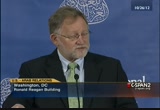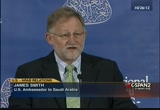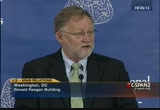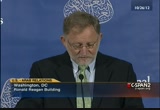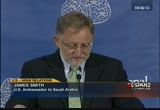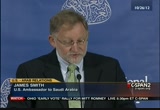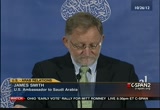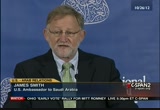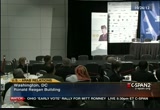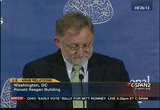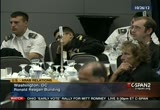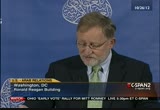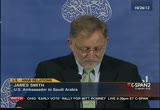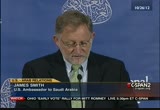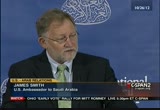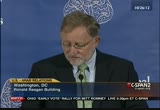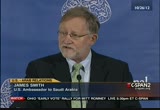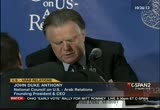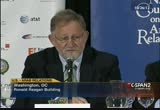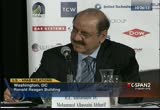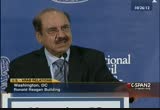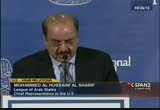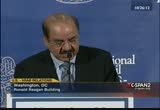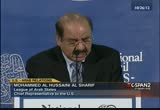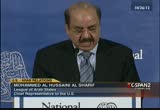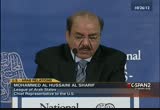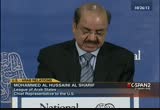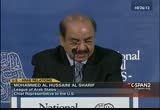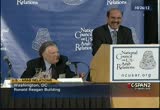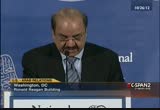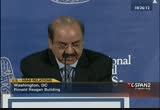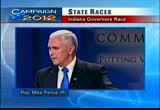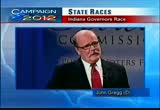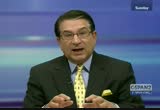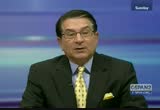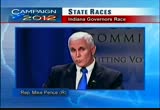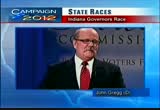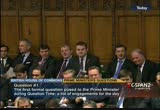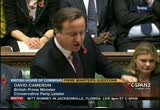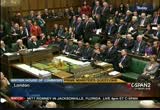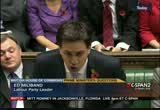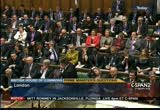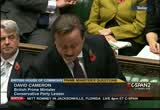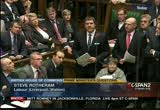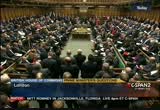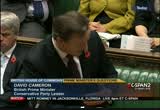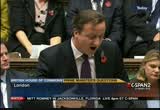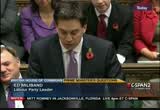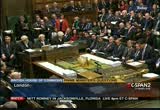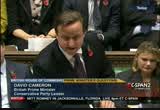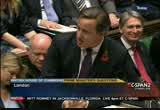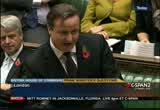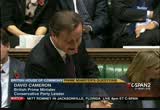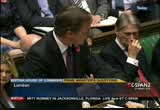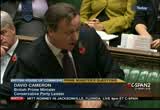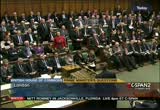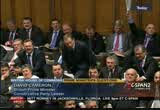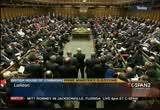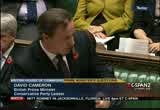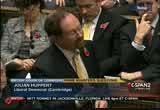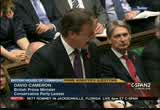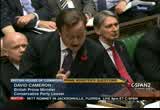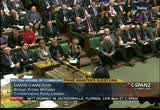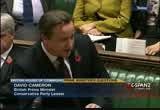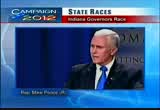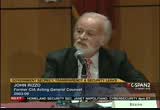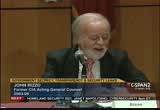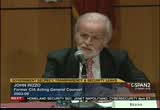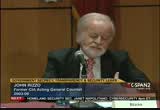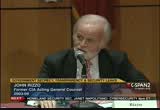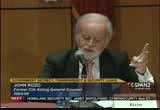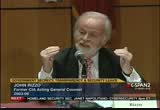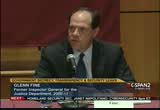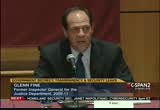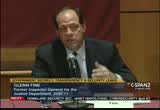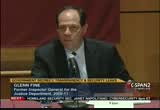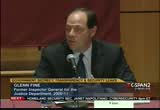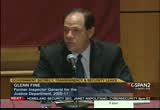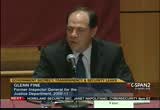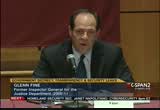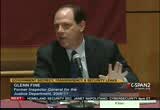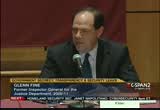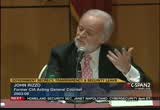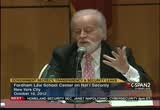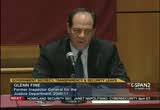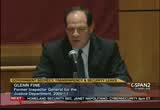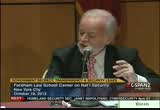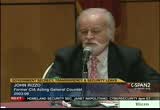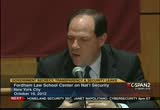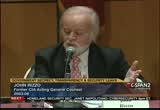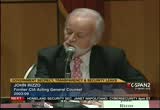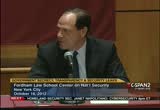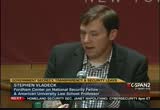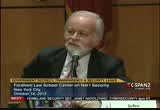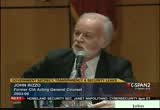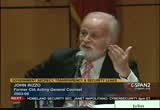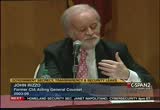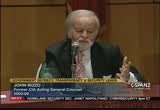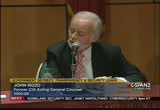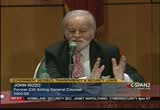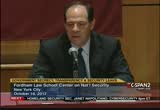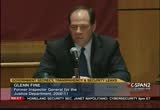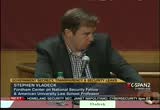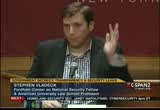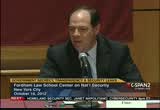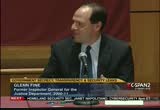tv U.S. Senate CSPAN October 31, 2012 5:00pm-8:00pm EDT
5:00 pm
the real spike is and that's when the five year time. not is in power in effect to find help. making demands on their government, demands for transparency and accountability. if they do not find alternatives, they could be in trouble. if you have a business, to help us solve this saudi arabia problem, you would be in a competitive position. this is not a theory. it works. i had the opportunity last week to congratulate ceo of electro- motor diesel, now part of the caterpillar company, on a contract for locomotives.
5:01 pm
a little over two years ago, a previous executive was in my office bemoaning the reality that he was about to lose a competitive bid to another country based on costs. even though we have had provided advocacy to the ministry on its behalf. he was sure that the contract award would be on price. when i asked him for his value proposition, he had little to offer other than our locomotives are better than theirs. they lost. fortunately, the saudi arabians agreed to take the winning entry on approval basis for two years. so they had a chance. a new team came forward and we discussed at length what it takes to win. the principles are fairly straightforward. first, find a partner in saudi arabia that you can do business with for the next 30 years. business and saudi arabia is a
5:02 pm
little bit like golf. the best chance is in finding the right partner. not someone who claims to have the ability to win the contract, but someone who's going to be in business with you for the long term. second, anchor a footprint in the kingdom. now, many entities have tried to do this in dubai and abu dhabi and even from the states. but the best model is to have a physical presence in the kingdom around the joint venture partner. they are larger than all the other economies combined come if you follow the money, which you are taught to do in business, the path leads you. third, focus on a domestic capability rather than safely delivering a sale. in the case of this, the value proposition was not about selling the best locomotive. it was all about helping saudi
5:03 pm
arabia develop its domestic rail infrastructure and matured through training and education and managing that rail system through the creation of a career in transportation. think about growing saudi arabia and talent and not hiring saudi arabians. many are aggressive in seeking out saudi arabian students for some programs. now, as they graduate, we will bring them on for training within the company. with the intent of starting them out in entry-level managers and engineers in the kingdom. they are starting a career. not just being hired on for a job. they did all this. they beat the competition. they won. other american companies are making a significant impact. not just on their businesses, but also on the future of saudi arabia.
5:04 pm
exxon mobil has a long tradition in the kingdom. among their success is a huge refinery about two hours north of a main city. the refinery has 92% saudi arabian employees. stretching all the way from management to blue-collar employees. exxon mobil was into saudia station before saudia station was required. we anticipate this to the same degree of the new refinery that they are building as well. they are focusing on businesses that can take some of these derivatives and turn them into products. this, by the way, is the key to the kingdom strategy called a knowledge-based economy.
5:05 pm
start with something you know. which in the case of saudi arabia, as petroleum. they moved downstream to refining. then onto products of element where you create intellectual property and start businesses by taking the derivatives in making products in all of this. all this creates jobs. the kingdom is employing this model in other areas. not so impressive as the joint venture between an aluminum company and the mining company. on the 12th of december, i will attend a ceremony in eastern covers where the two companies will pour the first hawk aluminum in just over three short years from the signing of the joint venture agreement. it is a massive facility. including a smelting plant and it will turn the minds of northern saudi arabia into she
5:06 pm
-- she aluminum and turn it into products in the kingdom. alcoa has an example echo by many other companies, and it is making a difference in the future of the kingdom. other success stories can be found in agriculture trade. there is an agriculture trade officer that is a significant job of opening markets and breaking down barriers for entry into products like sweet potatoes and beef. as a result, our agricultural exports have doubled in the last year, and due to long-term contract, i expect it will have continued success. those relationships have always been strong.
5:07 pm
owing to the decades long successes of important people. in addition, it has established a third leg in this important relationship. this time, focusing on the facility's security force and later on a myriad of initiatives in the ministry of the interior to ensure process and procedure for engaging with various agencies of our own government. that is certainly the success of a sales. especially in this relationship. i would remind the audience that saudi arabia has always been a reliable customer with sophisticated military equipment. it supports our strategic objectives as well as theirs. nowhere has a division of shared interest than were present when an education.
5:08 pm
as i mentioned earlier, we have around 60,000 saudi arabian students in the united states. and i take pride in partnering with the cultural ministry for their tireless effort and the support of the students and their families. i would also give a special shout out to the mission here for their efforts in opening medical training and education here in the states, which have often been closed. by the way, education does not count in our trade numbers. but it is important. while i am reluctant to do math in public, if you multiply 60,000 by 100,000 a year stipend per year -- that represents an annual investment of about $6 billion into our education system. it is good for us, as well as
5:09 pm
the saudis. on our end, education and the education office works tirelessly to prepare students for their experience here. and to also educate potential students on the opportunity. as i've often said to the ambassador, i know of no area where two embassies were closer together. but the shared interest in education goes well beyond the students. saudi arabia is building new universities for men and women all over the kingdom. they have gone from eight to 26 universities in the last decade, and there are many u.s. universities engaged with each of these universities. we have professional exchanges. there is a boom market for the teaching of english. and we are beginning to see more in the way of exchanges. modern technology has made an elective education a reality. i saw this firsthand.
5:10 pm
in an engineering competition and the university of colorado. american companies are actively involved in the kingdom's effort to improve k-12 curriculum. keep in mind that saudi arabia is spending 26% of their budget on education. it is third-seeded american educators and businesses are supporting in a big way this modernization effort. there is a careful manage before. saudi arabia took note of this and the government moved with a 138 billion program, all targeted towards the needs and concerns of the populations. i realized that there was
5:11 pm
criticism in some circles. as if they were buying half the population with increased subsidies. but i have to say but i have to say that the government response was much more sophisticated than that. at the time, we, in the embassy, we listen listened to the top issues facing the saudi arabian population with jobs, houses, will society, and the security apparatus. after it was announced, the package, the government responded publicly on each of these two issues. in my view, they demonstrated the key understanding of their own population and a responsiveness to the concerns of that population. this continues on a course of measured modernization. there does seem to be a genuine understanding the change is inevitable. but this is still an extremely conservative society.
5:12 pm
one speaking to consult cultural constraints and the government is attempting to manage this rate and pace of change. like all governments in the region, it continues to struggle. the forces of inertia are intrinsic in traditional government systems. nonetheless, when there is a shared interest in modern modernization, we are quick to bring resources to assist. we support the effort with judicial training from here in the united states. i lead a rule law forum back to the states last january. all aimed at assisting the judicial system. as the saudi system has moved out on a number of areas, we have supported their efforts.
5:13 pm
in yemen, saudi arabia played a significant role in brokering a gcc led political transition agreement. and continue to provide a leadership role in the friends of yemen and support of the government. there have been the last few years a trend toward multilateralism. i say that with some reservation because certainly the gcc and the arab league have been active in the last two years in ways not previously seen. most recently, saudi arabia has pushed the idea of a gcc union patterned after the eu. for secretary clinton's national security operation form. last month in new york, it provides a venue for collaborative securities discussions with all of the gcc
5:14 pm
nations. but something has changed. it was reflected in the recent summit last august. i spoke with many of and some of them spoke with a different idea in the atmosphere of the meetings. one individual in particular described it this way. he said the attendees had constituent concerns. these concerns were expressed. they were not just representing their government. there was a keen sense that they were representing their people. plus, they had to go back home. they had to explain their roles to their people. the arab spring has produced a very real sense of accountability on the part of the leadership in the region. ..
5:15 pm
the operative word for government was controlled. you can show the media and the message. you control the population is at the borders. you control local and regional events. it was true for the governments of the region. it is true for u.s. policy as reflected in the outsize focus on military capability. but today, information is
5:16 pm
ubiquitous. a generation ago in saudi arabia commie pressure nation from one or more of four sources, parents, teachers, imams or tribal leaders. every leader you make of the black area or iphone with every app known to mankind. a study abroad or colleges of many torments, living with students from other villages with different views. we have gone in the dark days of the cold war and eastern europe, worked would listen to their transistor radio to an era where saudis get 24 hour newscasts and receive constant twitter feeds. you cannot control the message and a longer. you can only influence. so the real question of the day, does the united states, and do the governments of the region had the necessary tools to be
5:17 pm
successful in an age of influence? let me close by thanking the national council for their leadership role in the great dialogue of the day. jen and i had the privilege of serving these last three years in an extremely dynamic region, uncertainty surrounds us, the air of spring certainly has yet to give away to an arab spring. but america's presence remains vital. thank you very much. [applause] >> ambassador smith says he can
5:18 pm
hear me. [laughter] before ambassador smith took up his posting in saudi arabia, he had an extended period of preparation and going to corporate leaders and diplomats are existing diplomats. he was an avid student, as was his wife, an educator in their own right. the predeparture briefings, we asked about an idea that's been around for some 20 years, but only recently has ceased and particularly by ambassador smith. you talk about points regarding
5:19 pm
the signing of saudi arabia and students here in the united states before they return home and providing them with practical actually hands-on imperial work experience to take them from the classrooms, the lectures, the brief scenes, the textbook in the learning on university campuses to inside the corporate headquarters, a branch office or some other aspect is the reality of the american partner saudi arabia commercial enterprises. this is more than a no-brainer in the cost is minimal. there are some challenges at the aerospace and defense industries , where classified material is to be protected.
5:20 pm
but in the engineering field, the banking field come in the telecommunications field, the education field and the consulting and providing its services and maintenance and operations and logistics field, the opportunities there limited only by the imagination. could you elaborate a little bit on how this is going in your view and for boeing in particular for seizing this opportunity and taking saudi arabia and students before they returned to the kingdom, where they expected to know a lot more than actually they would know, unless they have the practical hands-on experience. >> well, it's going well in dealing with the initiative of leadership and american firms we are seeing some success. boeing has a london presence as
5:21 pm
mro facility there in the airport. so they have a foothold to do that. i mention emd. this last summer and across the company summer high your program for students. they've got a 60 plus year presence there, so bill swanson, ceo clearly understands the value. here's the issue, saudi arabia requires irena scotty's. so you can intercept back and complain because you can't find any studies or you can go find them in the right here. as we do prefer the sophomore and junior years, you called that down to about half a second
5:22 pm
time you pick to rid three you like working for you and when you graduate, up at the front door 33, six month program and then i'll set you back home to imam, wherever i may engineering level miniature. and by the way, this is the career you have to look forward to. we found good response origin in the kingdom as well. once again, you can either sit back and complain about women's empowerment or you can hire women. we got a great push up american companies. johnson controls, the general
5:23 pm
motor dealership, ge and airy and. i mention i now call at these companies are all going in as part of the theater design is her program. professional saudis and the hiring of women. and by the way is parsons engineering has figured out, you get the pick of the litter, demotivated funds, dedicated ones. it's exciting to watch. it's a magnificent young generation. they're excited, connected,
5:24 pm
educated, motivated and they want to do something for their country. so we had to take advantage of that. >> as the two, parsons engineering has been a pioneer from the beginning and the way in which that relationship began shows some much the personal touch of the matters. in 1945, when the united nations was being founded in the meetings were being held in san francisco, three of saudi arabia's family members were out those proceedings. and on the weekends, parsons engineering and corporation based in california would take the saudi arabia delegations to its construction sites and its infrastructure achievements. and over the course of the time of doing this together, saudi arabia and fast, might you come to our country and show us how
5:25 pm
to build these kinds of things because we need them and we need a partnership with something like you. something as basic as that, informal, person-to-person much of this relationship. and routine regiment and from that to trust into confidence into mutuality benefit. the opportunities are the same pharmaceutical companies and law firms. one of those pharmaceutical firms told me they would be willing to take 40 saudi arabia and. if years, 10 a year to give internship training thin headquarters. the theory was that out of the
5:26 pm
four d., within the next decade, perhaps one, perhaps two, perhaps three. but even if only one would have signature authority for procurement or design or engineering for construction of a venture that stems from that initial internship. the same thing for law firms. and specificity of attention to detail this can be built i commend them for taking this a tear and building upon it and refining it and strengthening it and expanding it. both sides of in the process.
5:27 pm
we think the ambassador for this. i'll ask one last question and then will proceed to the next question. and that is the range of what you hear from saudi arabia and about america's handling, quote, unquote, of the issues pertaining to iran and the israeli dynamic within this dynamic. the range of saudi arabia and concerns and the prioritization of saudi arabia and could parents so that we hear from you and others more than we hear from the american media. their concerns come at their needs, their issues, their interests. >> well, it's key that you listen to all sides. in the street in that part of the world has long been convinced that we don't listen
5:28 pm
to the other side of the story. the challenge of course is translating that into our policy, but certainly in saudi arabia at various, you know, it's interesting that in three years i have never heard a disparaging word against an israeli or a sub six. that's not the issue. the issue is the government to government policy, which you can on the street is perceived as being imbalanced. in 2002, crown prince of dulles spent a lot of capital pulling two countries together in the air of peace initiatives essentially laid out if you can just resolve the issues, all 42 countries are onboard to open up relations with israel because
5:29 pm
there is a deep sense that the resolution and it is a strategic issue for saudi arabia, just like the united states. because in the absence of a settlement, every extremist group gets to use the palestinian issue to his advantage, even though not one of them has given to a palestinian to help her fly. it puts for the united states as in strategic and americans at risk. so i would not speak for king at a lot, but i would say it is a great place to start and under his leadership, he's got that part of the world wind up to move forward with a settlement. if in fact it is to be her
5:30 pm
destiny. >> well, iran is a great challenge. saudi arabia looks at iran a little differently than traditional american thinking. we look at threats has been outside threats facing the saudi's would use the word and saudi arabia in its role in the custodian of two holy mosques and the keepers of holy places of islam, you have to understand that last week during ramadan, the whole government shutdown. the whole government of saudi arabia shut down to support the 3.5 million pilgrims that were coming to mac in medina. this is 200 superballs four days in a row. that's what they do. and the government deeply
5:31 pm
committed to ensuring that every muslim in the world when they come for their religious responsibility can satisfy that without interference, without pressure, without political interference. that's their role in that religion. in iran, they see a challenge to the legitimacy of the oversight of that. it's a governance issue. it's not a sunni shia issue. and with iran's government, d.c. essentially death by 1000 razor cuts as iran has a coherent strategy for destabilization in the region, starting in baghdad, extends to damascus. hamas, muslim brotherhood and yemen, bahrain, the eastern province, wherever they can take
5:32 pm
an issue and turn it into a sectarian issue, that is the strategy that they see that iran is pursuing. so he ran as a very real threat to them. it's the existential threat in the region. >> thank you, mr. ambassador for enlightening us in this opening session of the second day of his 21st annual comp trends of u.s. policy issues. [applause] >> next we have a relative newcomer to the annual forums in the sands of the new league of arab states chief representative ambassador to the united states.
5:33 pm
i've known each one of them for the last almost half-century and each one of them brings to the cars in the table of background instead of experiences and this ambassador is no exception. ambassador dr. mohammed al hussaini al sharif obtained his phd from the university of houston on the side so to speak, in the evenings, on the weekend while the habit of saudi consulate in houston, which is one of the most -- the biggest in the most demanding and dynamic of the consulates in the united states. but he's also served in venezuela, fellow opec member with a very colorful controversial populist leader,
5:34 pm
some issues and concerns in the united states. he served in the philippines. he was saudi arabia's ambassador to turkey, which is very much in the news and rightly so in connection with many of the issues we are discussing here. and has continued to focus on issues pertaining to north america because he was also ambassador to canada. please welcome his excellency, dr. mohammed al hussaini al sharif. [applause] >> thank you, dr. anthony for the kind introduction. today throughout the world is a
5:35 pm
day of sacrifice and i would like to convey my best wishes to all of those to banning it today. before the fast development -- [inaudible] from where i start. i will start from a speech is a summary states in order to go buy your time. the recent developments in the region are what is being labeled as the arab spring. their kind in the history of the region come in the air of spring as we noted as one spoken, one common slogan in all five countries. simply stated, the people want the overthrow of the existing regimes. evaluating these movements among
5:36 pm
the countries involved. one finds a common denominator. the regimes were all in agreement and calling the people's demand for freedom, equality and justice as a conspiracy, which deemed to the people of the region. there are four thriving onto an air of spring events. they are first the fairest and most mobilized who were enabled by technology and social media. what has happened is that technology has enabled citizens to challenge the security forces. second, the role played by the military and the regime security forces, we have seen in egypt and tunisia the military was neutral and dice the regime of
5:37 pm
separation. thirdly, the region by outside forces, nato, libya, turkey, iran, russia and russia syria. i mean come in the foreign forces outside the ata. before this longevity the longevity of the leadership and all the arab spring countries has left no doubt as to who has been responsible for each country and grievances. despite all the understanding of the complexities involved, the league of arab states adopted a number of unprecedented initiatives vis-à-vis the crisis mainly in those libya and serious. the league's basic framers aimed at combating all forms of atrocities, violence and killing
5:38 pm
of innocent civilians of the two countries. just as an example of the 20th , 2011 and as a result, the use of military force against civilians in libya, the membership of libya called for a no-fly zone and in addition the lake supported the intervention of nato and the libyan crisis. with regard to syria and the crisis, the leak was deeply involved from the outset and our involvement is in many measures. i just mention sending a monetary regime of the theory and regime and the leak, with syrian opposition to impose economic finance on the syrian regime and the way that will not harm the people of syria, requesting the intubation, the
5:39 pm
call to the syrian officials have committed crimes against humanity before the international criminal court, inviting this is very important, inviting the syrian counsel to bear the responsibilities and given implementing chapter seven of the u.n. chapter. i listed the second by the league of arab states without evaluating its success or failure. but their importance lies in the fact that they are unprecedented by the leak. anyway, no country or organization were able to deal successfully with the syrian crisis. the u.n. security council, as many of you know, could not resolve the problem due to devito casted a russia and china
5:40 pm
against the resolutions mainly in the sense that the civilian population in syria and the necessity of reform into russia is a veto system in the security council of the united nations because i think no country will be allowed to decide the destiny of another nation facing atrocities by this regime. the arab spring as islamic political, mainly in egypt and tunisia. as the arab spring gave birth to a new democratically elected leader and regime with parliament, dominated by islamists or islamic movement, the u.s. came to the conclusion that it has no choice but to deal with whomever is in power or elected.
5:41 pm
few months ago, the u.n. hosted a meeting in washington to see that together the representatives and organization from egypt, tunisia, morocco and algeria. some of these islamic parties and organizations were banned in their own countries. and some of the delicate even would unite into the united states before the arab states. one member of the islamist litigation by stating that, and i quote, we are aware of the very important role that the u.s. plays throughout the world and we seek to improve our relations with the u.s. we are here to begin building bridges of dean the next phase, unquote.
5:42 pm
precedents in media criticism to the visited the egyptian delegation composed of fullness, the muslim brotherhood. jay carney said conn and i quote, our policy is clear and is the same. it is the fact that egypt political landscape has changed and the answers have become more diverse and our engagements have left that. we will judge egypt, not by their creation, unquote. morocco, algeria, jordan have not experienced the arab spring, the recent developments have shown some changes. the political institution in some of the countries are in the process of transition with more
5:43 pm
participation. it's best if ambitious public spending plan. we have same legal system and procedures are being performed to the aspiration of the people and their yearning for a good government and transparency. now, let me turn to the american policies during the arab spring. two initiatives, these initiatives i don't think were a coincidence, but anyway they came up at the same time in 2011 and the other 12011. august 10, 2011, president obama ordered a division board. the president made the
5:44 pm
prevention of atrocities the key focus of his administration's foreign policy. this initiative aimed at civilians and holding perpetrators of atrocities accountable. the focus of this initiative is the area and libya. the other initiative come in the second initiative is the open government or airship, which announced in september 2011 but exacerbated in italy. it was launched by governments and ninth society organizations and has grown to include 57 -- now 57 countries and over 300 commitment organizations reaching more than 2 billion teeple, all in just one year. some other countries have already joined her in the process of joining, which i
5:45 pm
think is a good thing for many arab countries. the partnership is an international airport to improve government performance, encourage participation and enhanced government participation to people and governments throughout the globe. the urban governor partnership of transparency, citizen, protection and accountability. the highlight of the policy of the united state is the memorandum of understanding for corporations that were assigned to the arab league and the u.s. department of state. this was signed on the sideline at the united nations given the meeting and knee-jerk on the 25th of september.
5:46 pm
this is intended to promote more effective corporation and coronation of policies and to develop dialogue in various spheres in order to achieve economic social, cultural educational and humanitarian cooperation. and also calls for an annual meeting between the secretary of state and the arab league. the call is also for senior officials, and at the press conference that the secretary of state announced that the establishment was more professional and cultural exchange program to bring arab league officials together with americans working on the same challenges. this ammo you came as a result of the unprecedented steps taken by the arab league to highlight
5:47 pm
the challenges of development in our region and particularly in libya and syria. secretary of state describes the ammo you as an opening and a new chapter in the history of the u.s.-arab league position. on this occasion, she said and i quote, the united states and the arab league have worked more closely together than ever before. we are shoulder to shoulder in libya and syria, unquote. given all the development in the region and the united states, this is the right time to revive the air peace initiative as there are several israeli voices who suppress their concern as a
5:48 pm
jewish and zionist state, which is present. that may give some examples. before i go to that, also the arab spring leaders who are elected democratic and i am sure those are more responsible than the former one and more accountable to the people and to the public opinion with any atrocities committed in the occupation. [inaudible] >> yes, i have an idea what the next session of which are talking about. we want you to remain for that. >> 22 countries, give at least
5:49 pm
10 minutes for each country. [laughter] >> know, 15 minutes. >> i took my time because i thought it was given the same time. but anyway, i will try to finish. i will give you some examples of some israeli officials who really commented on this. the former speaker of not set wrote an article in 2012 when he suggested a anti-semantic and not into israel to tell israel it is impossible to be treated as the only democracy in the middle east. why this is also in the western world. on the contrary, continued to
5:50 pm
political allies of the israeli future. here's another example. the crisis of zionism said that zionism is a liberal democratic project will die and that this will be the consequences of the building in the west bank encouraged by the israeli government. the former chiefs focus at the wilson international center and he said, and i quote, the threat towards israel is not the nuclear program of iran, but the vanishing of zionism, unquote. i said that he was worried about the future but israel and since he was so worried about the vanishing of zionism, why doesn't israel develop this plan? i think he should be put on the table now.
5:51 pm
this initiative was endorsed by the 22 arab countries, by the african union, by the islamic corporation organization and endorsed of course for the first time at the 22 arab countries. it was endorsed by the european union, you name it, but only by israel. perhaps it is about time now that the u.s.a. takes into account the sentiment and attitude of more than 360 million of the arab population with the 22 arab countries and 1 billion half billion muslims who are also sympathetic to the palestinian cause. however, one does not have to be, as you are a christian or a
5:52 pm
muslim sympathizers, but one has to be a human being. thank you very much. [applause] >> you know, indiana has been incredible progress in the last eight years. but honestly balanced budgets throughout the series. for the fiscal envy of the country and that we have the largest budget surplus we've ever had in our history. it's going to make it possible for us to strengthen budget reserves and i believe we can cut taxes for every hoosier.
5:53 pm
but he just had to pay for in indiana. that when you were speaker of the house, for five of the six years you are funding the state house, indiana deficits. when ms. daniels came into power just a couple years later and budgets to help to write, indiana with $700 million in debt and had a deficit of $800 million. facts are stubborn things. how are we going to make sure and preserve the fiscal integrity of the state of indiana? >> congressmen come if you spent the last 10 years in indiana, you'd know that our budget has to be balanced in indiana according to our constitution. i balanced and produce bipartisan balanced budget. and oddly, these were supported by fort wayne zone david long and the tenet of american, peggy stillman. i find it almost laughable that the united states congress and with lecture anybody about fiscal responsibility. he voted out once, not twice,
5:54 pm
but five times, congressman. you voted to edit the results increased her deficit by 200 billion, billion with a b. dollars. >> now look at the race for pennsylvania's 20 electoral college votes but a political scientist in the state. >> for the next server based on c-span's "washington journal" come we focus on key background states in campaign 2012. today the spotlight as the keystone state and pennsylvania enjoy nestor in harrisburg is terry madonna. he's the director of franklin and marshall college. thanks famous for being with us. let me begin with a broad overview of the political geography of pennsylvania and
5:55 pm
the comparison between east and west in your state. just goes yeah, first of all, like in a battleground state, pennsylvania has large parts bad in large part that are blue. if we just take a look at the western part of the state, it's the southwest in particular. if you go into the pittsburgh area and the counties surrounding it are, democratic voter registration, once you get the pittsburgh metropolitan area, which is democratic, you run into what we call the old mining and miltown areas, where coal and steel and lead in paint and glass and all of those industries that the pennsylvania economy dominated, particularly steel and coal. over the course of 40 years after world war ii, the industries went away, the economy suffered severely.
5:56 pm
the voters were typically working class men and women, roman catholic and religion and prounion. these come as steve, are the quintessential reagan democrat and they would be an counties adjacent to his spurt like beaver and westmoreland and washington ingrained and further to the east, cambridge, fayette. those counties have a propensity to vote republican, particularly in big elections. they're culturally conservative. pro-gun, pro-life, not particularly fond of. if you think of pennsylvania and drive big t. at the center of the state and fan out across the new york border, not quite getting to the northeastern part of the state, just a big t.
5:57 pm
that's the conservative blue area of the state. it's basically white. as protestant, doesn't have a definable ethnic group particularly. once you get used to the susquehanna river, with the exception of a few counties, the demography changes sharply. let's go down to the southeast. philadelphia heavily democratic, but before suburban ring counties, they are the same counties. they have an average two typically to win pennsylvania, you have to do very well in those same counties and then moving up a little bit to the north you have the lehigh valley, allentown and lehigh county, bethlehem and northampton county. if you take the four suburban counties out of philly and the two lehigh valley county's
5:58 pm
canvassing county soloway come you when those in aggregate. you when the total vote. you can lose one or two. you're probably going to win the state of pennsylvania. up in the northeastern part of the state in lackawanna and mossad, heavily democratic, scranton of course might be best known. joe biden mr. mayor. hillary clinton, her dad was born there. everybody starts to campaign in one way or another, the office and sitcom, scranton. it's a town i think that the voters there have an extra gene for politics. >> wee one phone line set aside for this to be within pennsylvania. we want to hear from you as we focus our series here on the "washington journal" on the key battleground states. terry madonna, since 1980, pennsylvania has gone democratic in the last time voting for
5:59 pm
republican george herbert walker bush. why? >> essentially what the democrats have been able to do is win the suburban voters as they pointed out a moment ago. come on to philadelphia with a huge edge. that's the largest principality in the state and has a heavy concentration of democrats. so if human philadelphia in the suburbs, steve, the four counties in the lehigh valley, let's say out of the southeast by 630,000 votes, it's pretty difficult to overcome that edge in other parts of the state, even if republicans win the infamous tea that we often refer to. the other point to remember about pennsylvania as it is dominated for the most part. 36 tv markets in the state, the philadelphia covers 40% of the voters of this state, all of delaware, which for a
6:00 pm
conversation is particularly important in the southern half of new jersey. so in order probably to be effective in the television advertising of campaigning, you've got to really advertise on the philadelphia television market, which goes up to the lehigh valley, by the way, way out into the western -- moving closer to the susquehanna river where i live, for example, just east of the susquehanna river you can get philadelphia television, but it's other counties to go right up to the lehigh valley. ..
6:01 pm
6:02 pm
cleveland area up to the northeaster carbine curbing democratic and the selfless being more republican, ohio just had a larger pool of these swing voters, if you will. they can swing the state either way, depending on if they bounce back one way or another. for example, governor corbett, the current governor, two years ago, when republicans swept pennsylvania, as they did many other parts of the state, for example, every one of those swing counties that i have been talking about with the exception of two of them, so we won, for example, bucks county and chester county and he won lehigh
6:03 pm
county and he won a few on the fringe as well. i like to put it this way. we are not quite new jersey, meaning that we are not all blue. and we are not quite purple, as ohio is your under the right circumstances, republicans can win our state. >> join us later tonight when presidential nominee mitt romney speaks at a campaign rally in jacksonville, florida. >> indiana has made incredible progress for the last few years. the balance budgets during all of those years, we become the fiscal entity and we have a large budget surplus.
6:04 pm
going to make it possible for us to strengthen our budget reserves and i believe we can cut taxes for everyone. but john, you decide we pay for things in indiana. when you were speaker for five or six years, indiana with $700 million in debt. we had a deficit of $820 million. facts are stubborn things. i would just like to know from my colleagues how we are going to make sure and preserve the fiscal integrity of the state of indiana. >> congressman, if you had spent the last 12 years in indiana, you would know better but it has to be balanced in indiana, according to our constitution. i have balanced and produced bipartisan balanced budget.
6:05 pm
i find it laughable that a united states congressman would lecture anyone about fiscal responsibility. five times, congressman, you voted in the results increase our deficit by $200 billion. >> bind key house and senate and governor races on c-span, c-span radio and c-span.com. >> great people and stories about american history. the first pilgrims in america came 50 years before the mayflower fail. they were french. they made one. they had the good sense to land in florida instead of massachusetts in june. but we let this story out of the
6:06 pm
textbook. in the middle of the night she killed her captor, she realized that her captor could be scout, she felt them, then she was heroine. they erected the first of june 2 an american woman. it showed her with a hatchet in one hand and the scalp and another. >> kenneth davis is our guest taking your calls, e-mails, and tweets. he is a best-selling author. on booktv on c-span2, watch us live. >> now we go to london for the prime minister's questions. this week, david cameron took questions on the future of the british economy. the european union budget, and the closure of a ford motoron n.
6:07 pm
plant. >> thank you, mr. speaker.oi i am sure the whole house will wish to join me and pay tribute to corporal david o'connor of the 14 commander royal marines and corporal channing day in the owe t army medical corps. we owe them and all others whort have lost their lives a deep debt of gratitude to the courage, dedication, they will never be forgotten by our nation. youmr. >> thank you, mr. speaker. i am sure that the whole house will want to associate itself with the prime minister'sprimeis remarks.emark we send our deepest condolences to our service personnel are and also their families. f >> will the prime minister confirm if you can't get a good deal for britain, he will use the veto and reject any advice
6:08 pm
from those who give everything d away give advice on those who gave our veto away? [cheers and applause] >> i can absolutely, i can absolutely give my honorable friend that assurance. this government is taking the toughest line in these budget negotiations of any government since rejoined the european union. at best we would like it cut, at worst frozen, and i'm quite prepared to use the veto if we don't get a deal that's good for britain. but let's be clear, mr. speaker, it is in our interest to get the deal because a seven-year freeze would keep our budget down. labour's position is one of complete opportunism. they send the budget through the roof, and now they want to posture and get a good deal for britain. -- [inaudible] see right through it. >> ed miliband.
6:09 pm
>> can i start by paying tribute to corporal david o'connor and corporal channing day, their deaths are a reminder of the unrelenting danger that our troops face on a daily basis on our behalf. they both showed the utmost courage and bravery, and our condolences go to their family and friends. mr. speaker, the prime minister has an opportunity today to get a mandate from this house for a real-term production on the eve of -- [inaudible] which he said he wants. over the next seven years, which he could take to the negotiations in europe. why is he resisting the opportunity? >> i think, mr. speaker, the whole country will see through what is rank opportunity. people haven't forgotten the fact that they gave away half our rebates in one negotiation. that they agreed to a massive
6:10 pm
increase to the e.u. budget under their government, and now today they haven't even put down their own resolution on this issue. the nation will absolutely see straight through it. he's playing politics, he's not serving the country. [cheers and applause] >> ed miliband. >> mr. speaker, when it comes to consistency, if we've forgotten what he said as leader of the opposition just four months before the last general election. this is what he said. i would have thought they were interest inside what the prime minister said when he was leader of the opposition, mr. speaker. this is what he said. at a time when budgets are being cut in the u.k., he said, does the prime minister agree in reviewing the e.u. budget the main purpose should be to push for a real term cut? that's what he said when he was in opposition. so, mr. speaker, when it comes to opportunism, this prime
6:11 pm
minister is a gold medalist. [cheers and applause] at a time when he's cutting the education budget by 11%, the transport budget by 15% and the police budget by 20%, how can he even be giving up on a cut in the e.u. budget before the negotiations have been in. >> we have to make cuts in budgets because we're dealing with a record debt and deficit. [cheers and applause] if he wants to talk about consistency, perhaps he can explain why his own members of the european parliament voted against the budget freeze in -- [inaudible] last year? perhaps he can explain why the socialist group in the european parliament that he's such a proud member of are calling not for an increase in the budget, not for a freeze in the budget, but for a 200 billion euro increase in the budget, and while they're at it they want to get rid of the rest of the british rebate. is that his ?oil.
6:12 pm
>> ed milliband. >> it's good to see -- it's good to see -- it's good to see the crimson tide -- >> order, order. government back benches including ministers, apparently approaching maturity. they've really got -- [laughter] no, i dare not. they've got to tackle their behavioral problems before it's too late. ed miliband. >> well, he's certainly getting very angry, mr. speaker. maybe he's worried about losing the post this afternoon. and the reality is, our people feel the same way as him on the european parliament -- [inaudible] ten days ago. the reality is this, he can't commit anyone on europe. last year he announced out of the negotiations with a veto, and the agreement went ahead anyway. he's thrown in the towel even before these negotiations have begun. he can't convince european leaders, he can't even convince his own back benchers.
6:13 pm
he is weak abroad, he is weak at home. it's john major all over again. >> his position is completely incredible. he says he wants a cut in the e.u. budget, but he doesn't sanction a veto. we've made clear we will use the veto as i've used it before, so let me ask him, will you use the vie toe -- veto. >> order. order. i won't be using the veto, and i will ask the prime minister, about the tenth time i've asked him to respect parliamentary procedure in this matter. >> thank you, mr. speaker. the -- [inaudible] region faces many challenge, particularly with the announcement of job losses at ford last week. will my right honorable friend agree with me that the case for a city deal for south hampton and portsmouth is particularly compelling? >> i do think it is particularly
6:14 pm
compelling that we make sure south hampton has a city deal. i understand they are on the list. obviously, the news from ford was very disappointing. it was black spot in otherwise a very, very strong performance by the british automotive industry, and i know the business secretary will be working very closely with the city council to do everything we can to help people find jobs. >> mr. andrew miller. >> mr. speaker, might i ask a very straightforward question that should command a straightforward answer? in the forthcoming police and crime commissioner elections, it's predicted that the turn is going to be as low as 20%. does the prime minister think that gives democratic legitimacy? >> i want the turnout to be as high as possible, but i recognize in new elections for a new post it is always a challenge. it's even a challenge when you've got dedicated labor mps resigning from this house to stand as police and crime commissioners. but one point the crime
6:15 pm
commissioner will be able to make is to celebrate the fact that since the election crime's down 20%. >> [inaudible] >> thank you, mr. speaker. in recent months northern lincolnshire has benefited from a number of positive announcements from local governments and the private sector that will boost the economy. however, my right honorable friend will be aware that kimberly-clark announced the closing of their factory in my constituency last week with a lose of up to 500 jobs. can my right honorable friend assure me that everything possible will be done by the government to attract new bids to the area? >> i know it is very sad news for the workers. as i understand it, the job council's working to establish a local task force, and the government will give it our support to support employees and help them find alternative employment. >> steve robberham. >> thank you, speaker. following the phone hacking
6:16 pm
scandal, self-regulation of the press by the press is simply no longer acceptable to the public. response to two recent polls to media self-regulation. mr. speaker, your ministers have been briefing against -- [inaudible] whose side are you on? >> members really must adhere to the proper procedures of this house which they ought to know by now. prime minister. >> i think we should wait for the leveson report to come out. a lot of work has been done. what i want to see is a robust regulatory system, and as i said in the house i think last week, to make sure if newspapers get things wrong that they can be fined, journalists can be properly investigated. we know what a proper regulatory system should look like, we don't have one now, we need one for the future. >> jack loprestie.
6:17 pm
>> thank you, mr. speaker. first, i'd like to echo the tribute to our armed forces and our fallen comrades, their families and our loved ones, a huge debt of honor and gratitude. last week we saw the sentencing of former staff of -- [inaudible] hospital who were found guilty of ill treatment and neglect. i had hoped these prosecutionings would help to bring closure, at least a sense of justice to the victims and their families. however, now we've learned the -- [inaudible] may have been subject to abuse elsewhere. does the prime minister agree with me that care providers such as -- [inaudible] should be subject to prosecution for willful corporate neglect? >> well, i pay tribute to what my honorable friend said about our armed forces. on the issue, i think anyone who saw those television pictures about how very vulnerable people were being treated would be
6:18 pm
absolutely shocked and just like me and i'm sure like him what about to make sure that the law will go exactly where the evidence goes. they are shocking pictures, shocking things that happened. we should judge our society by how we deal with the most vulnerable and needy people, and what happened was completely unacceptable. >> ed miliband. >> mr. speaker, our economy has the longest double-dip recession since the war, but lord -- [inaudible] said today and i quote, the message that i keep hearing is the u.k. doesn't have a strategy for growth and wealth creation. who does the prime minister blame for that? [cheers and applause] >> what michael actually said is the coalition is fundamentally on the right track. he said i praise its work for the industrial strategy plans, for pioneering city revolution and for the revolutions in education and tackling unemployment. that is what michael said. but frankly, we can sit here all
6:19 pm
afternoon trading quotes. i think he is making a much bigger point, and this is an excellent report. what he's saying is actually over decades in our economy it became too centralized, regions and nations of our countries fell behind, manufacturing halved as a share of national income during the last government, and during the boom years, for instance, in the west midlands there were no net new private sector jobs. he's dealing with the big issues. what a pity that all he can do is stand up and try and read out a quote. >> ed milliband. >> mr. speaker, he says the report is on the right track, goodness knows what he would have said if it was on the wrong track. business has no confidence in him, and deregulation -- his chosen approach -- is not the answer. now, let me turn to a specific area of the report, recommendation 61 which i'm sure he's familiar with. [laughter] he says, and i quote: the government needs to set out a
6:20 pm
definitive and unambiguous energy policy. [laughter] this is, obviously, mr. speaker, an appropriate day to be considering this recommendation on energy after the last 20 -- it's good to see the business secretary down the bench, by the way. i'm sorry that growth committee that he's on is so unmemorable that he can't remember it. this is an appropriate day to be considering this recommendation. so his energy -- i'm rather enjoying this, mr. speaker. his energy secretary, his energy secretary says he's against wind farms and enough is enough. well, if -- >> order. order. let me just say the government back benches is very straightforward, they either calm down, or the session will be extended at whoever's inconvenience that may involve. let's just be very clear, incredibly straightforward. ed miliband. >> mr. speaker, the energy
6:21 pm
minister says he's against wind farms and enough is enough while his energy secretary is gung ho for them. who speaks for his government? >> well, today the jokes have been bad and the substance has been bad too. it's not a good day. i tell you why it is a good day. it's a good day to talk about energy policy because today -- [inaudible] investing 20 million pounds in our new -- [inaudible] [cheers and applause] today is a good day to talk about energy because there's more investment in renewable energy under three years of this government than under 13 years of their government. and it's a good day to talk about energy policy because we've got a green investment bank up and running. that is what's happening under this government. there's been no change towards renewable energy. let me explain exactly. we've got a big pipeline of onshore and offshore wind projects coming through. we're committed to those. but frankly, all parties are going to have to have a debate about what happens once those
6:22 pm
targets are met, and he ought to understand that if he could bother to look at the substance. >> ed miliband. >> that was a completely useless answer, mr. speaker. [cheers and applause] there are investors all around this country who want certainty about energy policy. you've got -- it's very simple for the prime minister. you've got one minister who says he's totally against wind energy, that's the energy minister he appointed having sacked the previous guy, and he's got the energy secretary who's gung ho for it. now, he just need to make a choice for where he stands. he's got a wind turbine on his house, so i thought he was in favor. lord castlestein said in his report there are people who resisted his ideas. we know who they are, the chancellor and the prime minister. the evidence of the last two and a half years is the deregulation, sink or swim, their answer is not the answer. the lord's right and they're
6:23 pm
wrong. >> well, i've o got one thing to say. not you, mr. speaker, he, he's no michael hesselstein. [cheers and applause] >> [inaudible] order. order. i want to hear mr. swales, and i'm sure the people of redcar do. >> thank you, mr. speaker. the russians want to award the prestigious medal to the governments of australia, canada, new zealand and the usa have agreed, the u.k. government has refused. will the prime minister get this decision reversed quickly so that my constituent, john ramsey and the rest of the dwindling band of veterans get the recognition they so richly deserve? >> i have every sympathy with my right honorable friend and with
6:24 pm
his constituent, and that is why we have asked sir john holmes to conduct this review not just into medals in general, but specifically at some of the most specific cases of which the arctic convoy is the most pressing. and he is getting on with it. >> chris bryant. [laughter] >> the foreign secretary, the foreign secretary said yesterday that the rules of this house require that ministers answer questions. so there is a stash of embarrassing e-mails, isn't there? adam smith had to publish every single one of his e-mails and ended up resigning. why won't the prime minister publish all of his e-mails? can he really be a fit and proper person to judge on the future of press regulation if he won't come clean with the british public? [cheers and applause] >> there is, actually, another rule of this house which is be
6:25 pm
that you insult someone in this house, you do an apology, and i have to say i am still waiting. the fact is, it is this government that set up the lev szob inquiry, and -- leveson inquiry, and i gave all the information asked to that inquiry. >> [inaudible] >> the honorable -- [inaudible] pussycat, mr. speaker, is a coffee shop in my constituency. they've just had their business rate hiked up by 700%, and the chancellor's coming after the money even though they haven't yet heard the appeal which means it might have to close and jobs will be lost. can the prime minister come to the rescue? is. >> i have every sympathy with the business he mentions. of course, business rates are a devolved issue, so this needs to be taken up with the welsh assembly government. we've doubled small business rate relief to help half a million small firms, we've made it easier to claim small business rate relief, and we've
6:26 pm
given local councils new powers to levy discounts in order to support the sorts of shops and pubs that he's referring to. i'm sure that's the right approach to england, and i'm sure he'll want to take that approach to wales. >> heidi alexander. >> thank you, mr. speaker. in 2007 the prime minister identified one of 29 hospitals he would be prepared to get into a bare knuckle fight over, yet on monday it emerged that louison's a and e and maternity services could end up paying the price for financial services and elsewhere. which side of this bare knuckle fight is he now on? >> the fight we're on is increasing the resources going into the nhs. that is the decision we have taken, and she is on the side of cutting money into the nhs. what we have done, which the previous government didn't, is set out that there will be no changes to nhs configurations
6:27 pm
unless they have the support of local gps, unless they have strong public and patient engagement, unless they're backed by sound clinical evidence and provide support for choice. those protections were never there under the last government, they are now. >> margaret james. >> thank you, mr. speaker. in light of last week's positive growth figures, does the prime minister agree with me the policies regarding more spending, borrowing and debt is are the precise opposite of what the country needs. >> my honorable friend is entirely right. the economy is growing, unemployment is coming down, inflation is coming down, the rate of small business creation is going up, there are a million more people employed in the private sector than there were two years ago, and the one absolute certainty is that the worst approach -- and michael hesselstein confirmed it in his report -- is to see more
6:28 pm
spending and debt. we need to grow the deficit. >> jim shannon. >> i think the prime minister -- corporal channing day always wanted to join the army and for eight years served as a medic. our job is to save lives -- [inaudible] to see someone willing to hell when all -- help when all hell is bursting down them. he will soon return to a mother, father, fors, brothers who loved her dearly. to the the community who are proud of the contribution she's made. [inaudible] her courage, her bravery and also her heroism. prime minister, would you agree with me that army medics are often the unsung heros of conflict, and would he degree to meet with me to discuss the implementation of --
6:29 pm
[inaudible] >> well, first of all, i'd be very happy to meet him and his colleagues. it's something i have spoken to the deputy, the first minister and the deputy first minister in northern ireland. it hope it can be done, and i'd be happy to have that meeting. i think he's absolutely right that hose in the medical regiment do a fantastic job. it's been a huge honor and a privilege for me to meet some of them including in afghanistan, and when you see the service they provide, you really can put your hand on your heart and know that british military personnel in theater are getting as good medical care as i think anyone ever in history has got. it is truly remarkable what they do. >> [inaudible] >> number eight, sir. >> prime minister, the hospital will retain its actions emergency and maternity services. any suggestion otherwise is simply scare mongering of the
6:30 pm
worst kind. >> [inaudible] >> kettering has the sixth highest household growth rate in the whole country, and a&e admissions are up 10 percent year on year. given the hospital has been at the heart of the community for well over 100 years, don't local people deserve a clear assurance that our much-loved and badly-needed local hospital has a bright future ahead of it? >> well, i gave my honorable friend the strongest possible assurance, and the point i've made as i made to the honorable lady opposite is that there can't be any changes unless there's full public consultation, unless there is the support of local gps and strong public and patient engagement. but in the case of debtor oring, that is not on the agenda. as i said, any suggestion by the opposition is simply scare mongering of the worst kind, and i can see they're at it again. >> lindsay roy. >> thank you, mr. speaker. it's been said again and again
6:31 pm
to the house, but the importance of skill is to promote economic growth. so why, mr. product, did the -- [inaudible] >> the number of apprenticeships under this government is about 900,000. it is a record number, and it's hugely increased. >> julian sturdy. >> thank you, mr. speaker. the government recently announced plans to extend the freeze on council tax for the third year. unfortunately, the -- [inaudible] and has moved with remarkable speed to confirm a 2% increase next year. can my honorable friend agree with me that such a -- [inaudible] apparently out of order and would he urge counsel to look again? >> i will certainly join my honorable friend in doing that. the government has made money available so that counsels can freeze their counsel tax for a third year in a row. i think this is a very important way of demonstrating that we're on the side of people who want
6:32 pm
to work hard and get on who struggle to pay the bills, and i think, frankly, all councils should recognize that a council tax freeze is in the interest of all our citizens. >> dr. alan whitehead. >> when did the prime minister become aware of the plans to close ford's south hampton -- [inaudible] and was he aware of those plans when his government awarded a large sum of money from the regional growth fund to that company just a few days earlier? >> obviously, these issues were discussed, and we worked very closely with all the automotive industry companies in the united kingdom. as i said earlier, the news from most of them, from nissan, from toyota, from jaguar land rover has been extremely positive. what happened at ford is clearly regrettable, but we must do everything we can to help those people into work. >> dr. julian hopper. >> green growth is a key part of the economy. is the prime minister still committed to this being the
6:33 pm
greenest government ever particularly when it comes to policies on renewable energy? >> well, it is under this government we have seen more investment in green energy in three years than we have in 13 from the party opposite. the green investment bank that we promised,s that is up and running. the carbon floor price that we spoke about, that is in place. this is, indeed, a very green government, and it's sticking to its promises. >> [inaudible] >> the number of people waiting more than four hours in accident and emergency units has more than doubled in the last two years, and the prime minister won't intervene to stop the closures of a&e units at middle sex hospital, we now -- [inaudible] and i suspect despite his weasel words, kettering hospital too. [inaudible] >> i have to say to the honorable gentleman, i could not have been any clearer about the future of connectionerring hospital, and for him to say
6:34 pm
that, i think, is scare mongering of the worst kind. but let me tell him what is happening at the hospitals that serve his constituents. in may 2010 there were 52 patients waiting longer than 12 months. how many are there now? none under this government. that is what is actually happening because we're putting the money into the nhs, and they take it out. >> -- barron. >> thank you, mr. speaker. further to the vote on the 18th of october regarding the contentious decision and acts of the second battalion -- [inaudible] and given that we have very recently, only last night, met with the secretary of defense. would the prime minister meet with me and other interested members to discuss this issue? >> i'm always happy to talk to colleagues about this issue, as i know the ministry of defense and the secretary of state is. as he knows, we've had to make difficult decisions to put in place the future structure of the army with 82,000 regular soldiers and a larger reserve of
6:35 pm
32,000 territorial army soldiers. i think that is right. clearly we've had to make some decisions about the regiments and battalions, and we were trying to save as many as possible. i think the proposals have taken that into account but, of course, the defense secretary will go on listening to representations. >> [inaudible] >> mr. speaker, will the prime minister confirm that the changes to child benefit due to be introconstitutioned in january -- introduced in january this year, next year, is -- that the cost of that, the overall cost is very much over 100 million pounds? >> the changes that we are making to child benefit where we are taking child benefit away altogether from those making over 60,000 pounds, that is going to save two billion pounds. now, it is necessary to make tough decisions in order to deal with the massive deficit bigger than greece, bigger than spain that his party left us. and i have to say i find it completely inexplicable why the
6:36 pm
party opposite that says they want those with the broadest backs to share some of the burden oppose the idea of taking a child benefit away from people over 60, 70, 80, 90,000. i don't see why the front bench sitting there should go on collecting their child benefit when we're having to make so many other difficult decisions. >> [inaudible] >> thank you, mr. speaker. will my right honorable friend join me in con develop late -- congratulating douglas -- [inaudible] in my constituency on their queen's award or while successfully supporting -- [inaudible] does he agree with me that that is a fine example of british business on the up and, indeed, the best of -- [inaudible] >> i think the honorable lady makes a very important point. we need to have export-led growth in this country, we need a rebalancing in this country. that is what the increase in manufacturing and export production is all about, but we need to go further and faster
6:37 pm
and, that >> join us later tonight when mitt romney speaks at a campaign rally in jacksonville, florida. he is joined by former governor jeb bush. what's outlined in a p.m. eastern on c-span. >> you know, indiana has made incredible progress over the last few years. we have made balanced budgets during all those years. now we have the largest budget surplus that we have ever had in our history. it will make it possible to strengthen our budget reserves and i believe that we can cut taxes. but john, you just said did we pay for things in indiana. okay? but when you were speaker of the house for five of the six years, indiana ran deficits. when mitch daniels came into power just couple of years later, indiana was $700 million
6:38 pm
in debt and have a deficit of $820 million. that's are stubborn things. i would just like to know for my colleagues how we will make sure to preserve the physical integrity of the state of indiana? >> congressman, you would've spent the last 12 years in indiana rather than congress, you know that our budget has to be balanced in indiana according to constitution. i have balanced and produced bipartisan balanced budgets. oddly, when you talk about was supported by david long and our lieutenant governor. i find it almost laughable that a united states congressman would lecture anybody about fiscal responsibility. not once or twice, but five times, congressman, you voted in the results increase our deficit by $200 billion. >> find key house and senate and
6:39 pm
governors races from across the country on c-span, c-span radio, and c-span radio/2012. >> i have watched shows on the weekends when they interview politicians. and the politicians are talking about what they are doing in congress and if the legislation were different opinions. >> most recently i watched the debate. i wanted to see if and i knew it was on c-span. >> i like it because it drills down more important parts of the issues and it is not antagonistic. it is not hostile. and it doesn't seem to have an agenda that it is trying to push on some of the other cable tv shows. >> i agree, too. it seems fair. you get the real story there. it does not have to do with things that are negative. >> i go there to get the news and the facts and give more detail than just get talking points. so i want to learn something and not just be entertained.
6:40 pm
>> it is not as exciting as cnn or fox news, but you get the real story. i like it. >> jerrell and merry watched c-span on comcast. c-span was created by america's cable companies in 1979. rocky was a public service by your television provider. >> a portion of a recent conference at fordham law school focusing on transparency and public access to information. this part of the conference include remarks from cia acting general john rizzo and former justice department inspector general glenn fine. this lasts about an hour and 20 minutes. >> okay. well, we have found the
6:41 pm
solutions we need, and locally, i am only the moderator. you have to charge you with giving us some solutions. i think the way this panel is organized by context to what you deserve. i have not quite realized it would work out so well. we actually have the right people get the right context. both in terms of the law and in terms of the post- 9/11 decade and where it has taken us. and in terms of the self-regulating institutional function of government to figure out its own problems and make its own recommendations and suggestions on solutions. and in terms of what all this means in working in the field, on the ground, inside a covert realm. so we are going to try to tie this all together today by looking at some of these issues. i have trust that we are going to get to some answers.
6:42 pm
our panel today is very distinguished. first, we have stephen vladeck, who is a fellow at the central of national security this year. he is a law professor at american university. we have glenn fine, which is somebody many of us know and have always wanted to meet. he is now a partner was the inspector general for the department of justice for many years, and he's going to talk to us a little bit about what exactly that is. it will be referred to during today's proceedings. and john rizzo is the former general acting council of the intelligence agency, is now a partner at the hoover institute and who you will be happy to know has a book that he has that will be coming out very soon. it is called the company's man. i think we should just get started. i think we should get started with you first, john, to talk about what has come up with how
6:43 pm
the government officials who are here decided to cast the tone of the day. state of the thread throughout. just hop from your point of view. can you contextualizes little for us. as to generally how we appear within the context of national security and the intelligence community. >> thank you, karen. it is a pleasure and honor to be here. especially with all of you. this has been fascinating to listen to all of you over this dialogue today from people. it is something that i have respected from a distance. i'm interested to see how this discussion evolves into this issue. because i know we are supposed to be looking forward.
6:44 pm
but since i spent the last two years writing a book and was looking backward, i'm going to exert myself and try to predict the future and 30 years from now, did anyone see will hear anything i said before now? [laughter] to anyway, you didn't miss anything. thirty years from now, i will say that there will be a similar panel with different people. a similar panel discussing the phenomenon of leaks and what to do about them. and how this is getting worse than ever. and there will be distinguished journalists on the panel decrying the government efforts to remove media and making the job much harder. the point is that i was fortunate for having delivered
6:45 pm
the issue of leaks for my entire career. i served under six administrations in both parties. every administration decries leaks. every administration thinks that the leaks occurring on its watch are the most egregious in history. many administrations, including the current one also claim there will be a new transparency. with the american people. which, historically, in my experience, roughly translates into being transparent about what the guys before us there, but in terms of what we are doing, we are keeping it secret. so there are certain rhythms to all this. i was interested -- i thought it would make it through this
6:46 pm
entire day without anyone mentioning the valerie plain case. i am glad that it came up briefly. to me, honestly, that was certainly the most interesting during the bush administration. it crystallizes me a confounding -- many confounding issues that surround the school subject. frankly, i became cynical over the years about leaks and how bad they were, relatively speaking. how to investigate and how and what should be new legislation, i literally had three file cabinets in my various offices during my career. they were filled with nothing but legislative proposals on leaked provisions.
6:47 pm
we tried but we never really got anywhere over this. but i imagine that they were, as we speak, we renew our effort. the prosecution, first of all, it was my duty at the time report to the journalists. that is what we are charged with doing, reporting leaks, unauthorized disclosures of the media and leaks. it was a bad thing. it was a bad. it was very discreet and her name should not have been exposed like that. so there is no question that it was something we had to report to the department of justice. that being said, in the range of
6:48 pm
leaks and later on perhaps we can talk about the number of leaks currently as opposed to 10 or 15 years ago. but the truth is in the scale of things, that leak was not terribly damaging to national security. it was very damaging to her career. which was unfortunate. but the fact was that the classified information that i became aware of that was leaked, that was way down on the scale. in terms of seriousness. the other criteria are characteristic it had which typically does not make for a fruitful leak investigation is that many people inside the government, working for the
6:49 pm
agency. so those are the two main linchpins of how serious the leak is and especially when it comes to investigating prosecutors. it is neither of those categories. and yet, what we saw was a four-year investigation and prosecution, it was mentioned and it brought unfettered powers in the special prosecution, it took about 84 days that she spent in prison. for refusing to testify before the grand jury. and it resulted in the conviction of a man who is not bleaker. the actual leaker, as you will recall was a state department official who, early on, came forward and said i screwed up, i get it.
6:50 pm
so that was part of why i have become very cynical about new ideas and initiatives about leaks. we are always finding of leaks is the nature of the business. it may be for a number of different reasons, one which is ironically having to do with the post 9/11 reform. in that because of this need to share more information, the idea of breaking stovepipes, more classified information is shared among people across our network. that process is called wiki leaks. the state department and military decided that the only way to effectively communicate with one another is to put all
6:51 pm
of august or not. and that was very interesting. i'm trying not to be overly cynical, but i just think that we are going to be living -- you were all be living with the phenomenon of leaks for a long time. my friend also briefly alluded to authorize disclosures. again, that is a phenomenon that is not a partisan thing in my experience. during the bush administration, i remember it was terribly frustrating to us at the agency. we became involved in the post- 9/11 programs. there was a directive passed on from the white house and in what turned out to be the war on
6:52 pm
terror. we made ourselves available to him to discuss matters that certainly i thought were classified. now, i'm on the outside. i read through david sanger's piece. it doesn't take a scholar to realize those government officials that were talking -- my point is the message that extends down to the career people in the intelligence community, is that a few seniors talking, talking with impunity to journalists. but yet, the fear of god is put
6:53 pm
into them about not talking to any journalist about anything. and you know it is another reason that over time i grew somewhat cynical of there being a real effective way forward to deal with this matter. i have other comments on various things as well. >> i want to talk a little bit about -- to pick up on what john was saying and talk a little bit about, in addition to, what it means to be inspector general and what your role is. how much of it is retrospective and how much is in the midst of the discussion. and i would also like you to get out the topic of how you view this when you -- you haven't been out long enough, but is
6:54 pm
there a change of perspective is your working government gets behind you a little bit, or does it really say the same thing under serious. >> i'm not sure i've been out of government who really know how to make that transition. i still talk about the office thing we did this or read about. it's not me anymore. i was in the office for long enough that i feel committed to it and committed to the rule of the inspector general in various ways. particularly in the transparency issue. because i do think that inspector general's comment we heard this from a number of sources this morning, are an important function in the federal government to help transparency in effect to this oversight of government. i would like to talk about the role of the inspector general and what we did and how it can increase transparency, even in the national security world. so there are inspectors general in every federal agency. i was in the justice department for 11 years.
6:55 pm
most inspector general's are confirmed by the senate and are part of bipartisan consideration. when the administration changes, albeit a political appointees change, except for the inspector general. we don't have to submit a resignation, so i remained in administration through the clinton years and the pushers and the obama years. for 11 years i was there. and our role was to detect and deter waste, fraud and abuse, and improve the economy and efficiency of the agency. our role was also to promote transparency in what the agency did. i believe strongly in we believe strongly that it was important for the citizens to know what their government was doing. that is not only in the context, but in the intelligence area as well. we did a number of very sensitive reviews in intelligence matters ranging from review of the robert hanssen case, why wasn't the robert hanssen did not spy for
6:56 pm
several decades without them finding out when they initially came out. the fbi said that it was because of his tradecraft inhabits eclecticism and we were asked to look at it and determined that that was not true, that they had a lax internal security method and they need to do it through. not only did we do that before, but we also made public the findings of that report. a lot of people say, how can you do this? this is a sensitive area. the top-secret area. but we pushed very hard to make an executive summary of the conclusions of that report known. we believe strongly that the citizens deserve a right to know what was happening in their government. we also believe that focusing attention could have a positive effect on the fbi. and that was true. i do remember when we gave the report, we don't have the authority to declassify information or to let
6:57 pm
information out that the agency believes is classified or two since sensor to release. we do have information and we handle it appropriately. when we write our report, we asked them, what is classified were too sensitive to be released publicly and they will often -- quite often, they would over classify things and redact paragraphs is not pages. we would push hard on out and say to them, what is it about this paragraph. what is it about the these sentences. what is it about these words that would harm the national security if it was released. and we found that they had a hard time explaining it were certain reductions that they made. and we often found that this is not a science. someone said this morning it isn't mathematical. well, it is an art. you'll have people disagreeing with in the agency about what can be released and what should be released and what is too
6:58 pm
sensitive to release. it gives one person for example, in the fbi, the report that we would get. very significant reductions. we would give to another person, much less significant reductions in the derby with each other as to what could be released. we felt strongly that it was not sufficient to simply, with broad strokes, redact all sorts of information from the report that they needed to justify why would harm the national security. which is the standard, after all. by pushing back, we often got much information out into the public that it turned out was able to be released and gave the public an insight on what was happening within the agency. i believe that being within the agency, being inside and having access to information, you have an ability and the role that is almost unique in terms of the institutions that are overseen.
6:59 pm
you know what is happening within the agency. you know where the bodies are buried. you can't look at that area, they say you can't release that information. well, i have found it is very important to get the support of the head of the agency. the attorney general for the work that we did. i was very fortunate. i worked for five attorney general's. attorney general reno, ashcroft, and gonzález and mcgahee and attorney general eric holder. every one of them did not interfere with our work. they recognize that we were trying to improve the performance of the agency. ..
7:00 pm
and make recommendations for improvement. and the fbi and department of justice to its credit i think were very receptive to the recommendations. they often would try and justify the policies, but would agree with the recommendations and after all that's overturned to do as well as provide transparency on the actions and the intelligence agencies and the department of justice. a lot of what we did was retrospect it. with the good things after they
7:01 pm
occurred such as the 9/11 attacks and the department of justice knew about it. but a lot of it was we were getting information as programs were ongoing and we would look at them as the programs are going forward. for example come with national security letters, we got information about misuse of national security letters and decided to do it as we were being used. i think i was very ongoing country and important. we had a unique ability to cowinner@problems that to the end, the fbi didn't know there were these problems. when we found them, they were surprised and also willing to make change because of the things we have found. so we were able to do it on a real-time basis and also retrospective basis of which are to do of them. so i do think that there are many entities and institutions that are important to provide transparency to oversight over
7:02 pm
intelligence agencies. we've heard about them this morning. we've heard about the congress' role, the presses roll, which is a critically role. we heard about the role of the course, which also has a critically important role as well as the role of outside advocacy groups and interest groups that can have an important role in spurring action on behalf of federal agents these. i also believe an internal mechanism such as inspector general office, strong inspectors general office will take complaints to look for problems that will make things transparent can have an import effect comes even in the intelligence area where there is very important national security information so it cannot be exposed that can be made public for the national security. as we tried to do. >> i have a question for people of the audience, which as you read these reports. >> weave multiple audiences. our audience partly we have an
7:03 pm
obligation by statute to report to the attorney general, head of agency into congress to keep them currently and fully informed of any problems we found. so audiences are multiple. what is the agency itself, people running the program to help them improve the program. two, the congress, which has oversight over the programs and they have an import right to know. and three, to a large extent the american people. the american people have a right to know how their government is operating under the tabbing problem so it can be approved. without we should make that known writer report for multiple audience. we need to rates of the technical expert understands and recognizes that there is benefit in the report and the findings. we need to read a member of congress he picks it up to understand what's going on and what needs to be done. we also need to write in a way that a layperson, the public can understand that can be done as a
7:04 pm
result of my report. >> you've written, i think, the most serious ig report to come out of the past decade. when you look at nfl's enough yet generally, et cetera. how do you parse the conversation to talk about what is withheld for national security reasons in terms of clear national security can turn. but we want to cover what we were doing and maybe it wasn't malicious or intended and we're just really is an attempt to not face what we've done. >> there is to some extent the tendency, a human tendency to try and minimize and not disclose embarrassing information. and we find that sometimes when we provide the report to the entity and particularly the sensitive area people who were
7:05 pm
involved with the program would be much more interest in and having more redacted than i think some of the standard that matters and declassification. so i think there's a national -- natural tendency. i think it's important to push back and make the entity justified by particular sentence, dented the sentence, down to the word would harm national security through his release, which is a standard after all. why is that this would provide information to the bad guys that they could explore in someone as opposed to a program is not working and needs to be improved because i think embarrassment or weaknesses in the program is not sufficient to make something not disclose well. they are to improve the program rather than simply say we need to withhold information about a feeling program.
7:06 pm
>> were going to come back to that, but i want to turn to steve. steve, you have to start part of this conversation, which has to go with where do we stand between secrecy and transparent the in terms of where we've come over the past decade plus and what do you think the big challenges going forward? >> i actually think john put up rather nicely when he suggested 30 or so now -- i think i actually might be on it. [laughter] because if you go back and look, the late 70s and john probably has the transcript of his file cabinet. there are these hearings about how to amend the national security link you and how to strike the balance between the media straight to pursue national security investigations and the government tried to keep it a secret. and there's all this beautiful rhetoric from what john's predecessors at cia, tony blackcomb about the difficulties
7:07 pm
that individuals in his position face because of what the benign indeterminacy of the legal regime in this role. so we start from my observation that structural problem is not new. the structural sort of tension here is not new. at the same time, i think there is something different, qualitatively and quantitatively about the last decade. and i think the differences although the law hasn't moved that much defining the parameters and boundaries between government and media, government and public, the net result has been less information to the public. part of the reason is that has nothing to do with the legal regime, or rather with the general hostility to public rights litigation in general and the extent to which it's been not much harder for us at the national security concept, to live inside security context for
7:08 pm
private individuals to sue the government almost any claim, any theory, especially in national security cases. not uniquely national security cases. that in turn has put his colleagues and fellow i choose to serve the function that for the better part the public had been complementing in excess of the match fraud and abuse, but government legality. the idea since it are important function. the first is not everyone is glenn fine. i think we see the reports about other ig's who have been less, i think, rigorous in their statutory duties. but their mandate isn't necessarily investigating wrongdoing by the agents be. and i'm not sure they wanted to be the only people. we have to have a a conversation
7:09 pm
to meaningful reform. they have to proceed in two different directions. one, how can we restore the role of the public can actually obtain this information? how can we bring back the utility of public rights litigation, not just the national security, but outside and in the national security context. and second, what role can congress plan and change in the substantive driving the conversation. so we heard a lot about congressional oversight and how it supervises government action. what i think was missing from a conversation with congress can also play a more direct role in legislating the rules that govern these cases. it's taken as a given that congress is not the constitutional authority to interfere with the executive branch's classification powers. if that's true, it is belied by historical part is because there's actually several
7:10 pm
statues. i think the most prominent, where congress has specifically legislated rules for classification, procedures, standards, rules for declassification and so on. i don't need to say the atomic energy act is part. so what's the answer? atomic energy act of 1924. no, but this is a large, breaking john and i part company is i don't didn't this is sort of this is how it is, how it always has been and shall be and therefore we should accept it. i think there's parts of this bitter row with the intention. stewart gave a great speech in 1974, where he said the media is always going to want to obtain classified information and the government will always want to try to stop them. that's never going to change them they shouldn't be surprised by that. we do have to have a serious conversation about how much less the public knows about what the government is up to a blogroll congress and through congress the courts can play and
7:11 pm
circuitry situating that debate. that sort of where i would start. >> you think the american public believes now doesn't know that much about what if going on quite seriously, they know about torture. they know about rendition. they know about guantánamo. they know about the predator drone killings. they may not know so much about it, but what is actually going on here? is very public clamoring for more information? you hear the word transparency, but what is it that you think the public, not just "the new york times," but the public wants that they're not getting? >> i'm glad it's distinguish between "the new york times" and the public, even though i am a new yorker. i think it's a tricky conversation because i think karen is exactly right that the public knows probably a lot more than john successors would like them to know about but were up
7:12 pm
to. the flipside is there's no and then there's knowing. i think are the earlier conversation is a lot to be said about if government formally knowledge is what it is and is not doing them plausible deniability is not just a joke anymore. plausible deniability is what the whole conversation is about. if the government refuses to acknowledge, it can only say it didn't happen. you know this better than anyone. there's still plenty of people out there who say no, we never torture notwithstanding the senate armed services report, notwithstanding any number of to my view, uncontestable sources suggesting that we did. so part of the purpose of formally acknowledged knowledge is a weird construction is to provide leverage for those who want to settle the conversation once and for all. if you back up a step, in the
7:13 pm
holocaust denying controversy, the most important thing that happens in that conversation is the ability on one side to the deborah schultz of the world to say actually carries all of the official documentary proof we have. i think that's what information matters. not because and cocktail party conversation you can save heard about this, but because you can prove certain things happen in a way that settled and you can move on. so the public may know things, but the public doesn't know. >> john, you should weigh in on this because one of the things said whenever talking about the intelligence community, one of the things that is assumed as however much we know, there's always so much that we don't know. so i guess one of the questions is when you're thinking about classification versus not classification, the classification versus public
7:14 pm
knowledge. is there a sense there's always a certain not only need to need to decide rather not on what's not going to be known, how much is going to be known. is there a sense of obligation to the public in this regard? >> this was brought to me in the post-9/11 years. sort of a self-indulgent view when i evolved from being under the radar lawyer to a notorious public figure overnight. sites and personal bias personal bias and less, but i think at least are the agencies on the institutional protection than self-interest, we should have pressed the white house and on the final analysis is the white house calls come in that agency calls to be more, i won a word
7:15 pm
other than transparent, but more forthcoming about what was being done in the war on terror and what wasn't because there's many leaks that were absolutely accurate. others were not accurate and were egregious. and we should have done that. amen, the interrogation program in particular, i personally think is a huge mistake and i take responsibility for this because i was in a position where should've done something about it that we were more forthcoming with the congress. we kept it in a very tight box. leadership of the committees. as a result, our elected representatives knew nothing. all they knew was what they were reading in these press accounts. and i think it certainly did the agency considerable damage.
7:16 pm
you know, many career people, anxiety, subject investigations. so as a germanic experience and i think now knowing what we know of course it's much easier. we as an agency should have been looking more to what we felt could be made more public. rest assured, there's still a lot of secrets that are secret, so it's not like everything. >> such as? /tax >> there's some good ones, too. so i don't want to be overly gloomy. i mean, secrets can be good, but they have to be tightly protect it. i've seen some covert action programs is no matter how corporate and in the outcome the week.
7:17 pm
>> the truth will out no matter what, so you may as well control outcomes up. >> madness especially. bad news always comes out. >> so i guess the follow-up question to get to the remedy is if you were back in the situation that would've worked well, what message? would just be one to say in a certain context? do you need some kind of normal -- normalized wave going to congress if it's an itu? i mean, what is the mechanism you think would've made it right? >> well, i'm anachronistic trade. the fbi is much better at this, always has been, about presenting the public fees. what the public gets about the agency is the movies and the spy
7:18 pm
novels. i always thought the agency, and this to me is an optimal movement to it. cia directors, for instance, frequent press interviews. you can go on, face the nation in a public space. and explained, is the controversy over the interrogation program builds and builds during the post-9/11 years went on. go in front of the american people and explain one, you know, whenever we doing this? what it was yielding and the kinds of -- the kinds of mechanisms being put into place to try to minimize or certainly assure that there wouldn't be these flagrant kind of abuse.
7:19 pm
to me to think it would be terribly effective. i'm just a regular guy in the public. efficacy. >> in some ways, maybe not the cia director, but in some ways the radiophonic ministration has put official after official inside of the public, whether it's john brennan -- >> it was. >> i'm just saying. >> there were things that we can't tell you about. so let's tell you what loose terms. let's make sure you're aware that there's things we can't tell you about. >> right. the other thing about this we haven't gotten just a distinction between procedural issues in subsequent issues will get out there and talk to you about a substantive issues in our contacts in the administration, but what the public wants to know what i was trying to get out before it is what are the procedural issues? how do you decide you're going
7:20 pm
to have these targeting killings? how do you decide who your enemy is. >> and who's deciding it. >> that's what i mean. exactly. so yes the question, what is at the public wants to know, one of the thing is what is the process by which this is happening, which may be in some ways is the development of the whole conversation. maybe getting to the procedural issues is important. >> also to come to be one the process of making the decision, but the mechanisms to ensure the supervision of decisions, whether it's reporting to congress on a regular basis and not only the chairs of the committee for the gang of eight, but a significant number so there is buying into the actual decision-making process, whether again the inspector general or another internal oversight. and i believe they have a pretty strong inspector general at the cia was something very very
7:21 pm
coming for import reviews. they do have a mindset may be because of the nature of the work in the agency that the reports are not going to be made public and there can be reports that can be made public even if it's just to the extent of a very general basis on what's going on in the type of oversight being done that can reassure the public there is adequate mechanisms to make sure that there's oversight over very top-secret and closely compartmented programs. it's not simply decision-makers making decisions on around without any oversight whatsoever. >> one of the more interesting moments in this conversation is after "the new york times" and "washington post" leaks to program in december 2005, the justice department is that this white paper in january 2006 that is basically, you know, the ready for prime time version of the legal arguments in support
7:22 pm
of at least publicly reported aspects. you know, i had substantive objection to some of the analysis in the white papers, but it was an enormously useful development both in the administration perspectives insofar as putting out the legal rationale and the perspective of solidifying what were and what were not the legal objections to the program. so even than the actual internal report was developed into a wealthy opinion or whatever can't be released because they contain sensitive material doesn't mean there's no other way for the government to actually share that which the public i think wants to know, which is why you think you can do this and what is the authority i wish he base this concept? that's a distinction we should draw more. >> and can we trust what we hear is accurate amateurs and that were not being misled? has to be another piece of it.
7:23 pm
i just want to get to another question from you, glenn, because john answered this and i would like you to answer it. if you could fix something, what would you fix or change or reform to get better transparency in terms of government self-regulation? >> i'm not sure what to fix this, but i did see a nighttime extreme differences of opinion about what should remain classified or too extensive to be busiest at the fbi had a designation called law enforcement sensitive, which is very vague and could encompass all sorts of things and what could be released. i do believe there needs to be better guidelines and guidance on what is actually encompassed by those terms and what would harm the national security. it's too individualized now.
7:24 pm
i think the person who's reading it in during the classification review are to be greater uniformity in what is classified and what doesn't. >> steve, do you think that's possible there's uniformity across the agency in terms of criteria for what determines a threat to national security are not? >> i think there can certainly be more uniformity. it's probably not attainable if for no other reason than because so much as the fbi law enforcement, the cia concerns counterintelligence. so treasury, for example, might have a different view of the transactions. but to me the effort is worth it. you understand that pete k. specific variations. one set of uniform criteria with some adaptations to govern. >> i think one of the things that might be really interesting to think about in terms of the
7:25 pm
criteria is what it means for something to be a minute. but the long-term threat and a short-term threat and how do you speak to both of those things? i am interested on in john if there's a nice sense of distinguishing between those things. you say something is a threat to the united states come you could probably play a lot of things into long-term threat. is there any sense that it has to be a threat to national security in a shorter period of time? how does that appear year-to-year? john, do you want to start? >> well, yeah, these are not -- these are not easy calls to make. generally, and staring at the camera here so i'm censoring us a talk tidbit generally and the post-9/11 years, the general criteria for the more aggressive show was a counterterrorist
7:26 pm
actions is that the target individual, the group has to present a continuing and direct threat to the united states persons or interest. for instance, we could not have cashiered pennock qaeda guy who is basically a bad guy in the early 90s, san africa with bin laden, the suddenly turns up after 9/11. there was no intelligence indicated. he was a continuing, much less direct threat. but it's easy to piraeus encumbrances in law schools. i mean, it is far messier
7:27 pm
frankly when there is a target suddenly appears on the screen. unaware of the cia has to win, what can we or can't we ever going to the senate or to minute, so let us know. so it's very hard. the notion of writing regulations, and instinctively as lawyers for the your specific regulations and criteria across the board is easily understandable. glenn is right. i will tell you there will be -- the intelligence community, i can speak to the cia. the cia bull fight tooth and nail the shoe horned into criterion about what constitutes national security and they won't do it. dod will have a different take. it's just not going to happen.
7:28 pm
it hasn't happened up to now. really i would hope this is not in the cars. it's not the way the institutions operate. >> you know, john cowan can speak to this much better than i can. they may well be right to agencies will fight and nail. if the question is whether such a standard can be imposed on them, keep in mind the espionage act as are referred to information at the beach to the national defense and the statutory term. presumably congress has the power to give context for further context of the statutory term. i'm with john glenn on that point. i think maybe the better solution is a cooperative process for its like notice the rulemaking from over its proposed standards of individual agency show up outside the context of a specific case where the politics are sort of skewed consideration and then figures a
7:29 pm
general category. to be a very interesting exercise. >> were perhaps concert review so it can change over time? >> in response to your question, the threat can be eminent or long-term threat and can still be reasonable threats that need to be addressed in the national security context in the declassification review. what struck me when we're doing our reviews is not the imminence argument, but the mosaic argument that this alone won't be spread, the combined with this, deus, deus, they spun it out so broadly that anything could fit within the mosaic theory and anything could as a result be classified or too sensitive to be released. there was a tendency for potential abuses that era as opposed to the imminence theory. and that's why we try and push
7:30 pm
pretty hard. how does this -- was a scenario that there's a reasonable theory on how that worked. we would accept that. but oftentimes there was no theory about why this should remain undisclosed. >> at the general institutional question for all of you in terms of how government functions in these ways. and that is the part alamein and jane mayer both wrote about this for the bishop illustration about when the cia briefings were given to the officials that there is, there was sort of a lack of knowledge of what this meant and what context they were actually in. so when i'm curious about is when you get a new administration, which could have been come you get a new president and a new team. what are the mechanisms and who are the people that brief them in such a way that they can help
7:31 pm
you and others shepherd this conversation about how to assess the threat and especially in the mosaic scenario, where so many different scenarios can be paid out at the potentially dangerous. you need people in the room that come up in the conversation with a little bit more of a long-term understanding. >> well, let me try that because i went through several of these in my time. i mean, i was the liaison with greg craig for the transition from the obama -- i mean, from the bush to the obama administration in the transition. the presidential candidates, even the nominee's authority do not get really president-elect bush called the stuff in terms of regimes. the two candidates i assume governor romney is getting these
7:32 pm
now. the nominees of the party are offering intelligence briefings by career people, but the analytical or what we used to call briefings, which is one of the many euphemisms from cia's panchayat to purge from my memory because i can't get it out of my head. but their analytical. they are not operational. they're not given a lot of specific details about agents and agent operation that only happens once the election takes place. once it is in the case of the new president, obviously a president obama is reelected, this will not happen. but that is when they get the review above the ongoing covert programs. that is some president-elect obama first had a detailed briefing on the enhanced interrogation program. by that time, much of it, or
7:33 pm
suppose "the new york times" probably had 85% of it. but that wasn't the first briefing. that's when president was a crash course i guess is that i'm trying to say. he and the international security team had to get briefed up very quickly and be ready to act from literary january 20th on threats. and there were threats on january 20, 2009. so you know, it can be a frantic process, but you know, like a lot of things that the american governmental system that seems all screwed in some somehow we always seem to muddle through, but that's how it happened. >> would always briefed incoming at mr. chin, the attorney general and the transition team about the top challenges. we would have had this to talk
7:34 pm
management challenges of us always counter terrorism since 9/11. we would assess where the apartment was and what needed improvement, what programs we had reviewed, what other programs needed review. there's always an important briefing for them in this eye-opening to some extent, the scope of the challenges they face when they came into the frustration. >> one thing has to do with longevity officials did you talk muller since 9/11 and this kind of interesting the transition. one of the things that has to be thought about in terms of reform are not reform its institutional memory and the kinds of people that get chosen to run these agencies. so you're not always reinventing the wheel because the idea we are going to be here in 30 years. i don't know about shoe -- discussing this again, it would be nice if that wasn't the same turn of the wheel. because if it is, there's a certain kind of complacent the
7:35 pm
back and sat in, that this is part of the cycle. i get the feeling that's not exactly we were at. >> just two points cut slightly in opposite directions. first, i don't think it's longevity as much as longevity in the middle. and even the career so will service. my sense is that the obama administration was surprised just how deeply ingrained i do want to say pathologists, the search approaches, certain understandings were in various departments. in dod and pay for doj, et cetera. et cetera inculcated institutional identity that you can't just changed with an executive order. so insofar as that's true, it's unrealistic to think that any president, no matter what can walk in the first day and say i'm going to close guantánamo. but the flipside of that is i think that suggest then that the answer is not in the ticketed
7:36 pm
brightside or at least not exclusively. the answer is more than interbranch mechanism. more of a dialogue and more of it clearly contemplated rule, perhaps even the transitional stage or congress or the courts. just to be clear, congress has defined what transition. they defined presidents nominees. it can actually be a serious conversation about policy agendas and things important not because of the candidate, but because congress wants to get on the record that the priorities are. and the course of more of a role to play, too. it's not a coincidence that the supreme court did what it did right at the turn of the obama administration would do two or three high-profile terrorism cases because he was saying hey, show us what you've got. we'll give you another chance. so i think there's always going to be pressure to matter what else is true to go as far as possible within the limits of
7:37 pm
law to protect national security and we should want that way, but we should also accept and create the bench mechanisms to sort of put pressure on the other direction. >> i think we should open it up here but don't have a lot of time left to mrs. glass panel. i think we should open it up to the floor. if anybody has any questions. i don't know where the microphones are. are they anywhere nearby? you have to wait, sorry. >> thank you. picking up on something that mr. rizzo said that the cia will resist any attempt to impose what constitutes national security or a threat to national security, such as ms. vladeck
7:38 pm
suggested. and also the fact that he talked about the national interest of the united states. then came back historically, i wonder whether we might send times the cia perceived national interests as including the elimination of the trillion president, or the elimination of an iranian president because that i think looking at historic lee, were two events that created major problems for the united states subsequently, problems at the ranch today directly attributable to the elimination of most of that at the cia, assuming that it really was the cia in chile as i think a general expectation is that it was the cia. so i wonder, is that something we might face again with an independent free ranging cia?
7:39 pm
>> believe it or not, i'm old, but i'm not old enough to attend around the cia during this event. nor the bay of pigs could someone once got up and asked me how did i handle the bay of pigs and it was very depressing. last night you know, the cia uniquely as an arm of the president, the white house, whoever the president is. and every president has been that way. again, this is a bipartisan team. some presidents have, and initially weary or suspicious or in the case of president carter, fairly hostile to the cia. i'm telling you, i think senator moynihan said at one point now is his cia, so they tend to get very aggressive. i certainly wouldn't dispute any
7:40 pm
characterizations about be careful what you cause to happen in terms of reverberations down the line. but i mean, people should never forget the cia entry about the idea of let's about how he and a poor overthrow the shah. even wild west days, the cia did not conduct plots in the early 1960s because they thought it was the right thing to do. it is because the white house, the administration existing at the time directed to it. the difference today is presidents have to go on the record. if they want the cih attacker would've to read read a presidential finding and hosted it and has to report to congress. i came in right after the church committee, one of the first
7:41 pm
higher for 20 years old, didn't know anything. but the process started from that day and my experience over the years as finance can be bringing instruments on the president. and this was one of my predecessors to get out the ones to do that, sign here. i've written a piece of paper. sign it. you'll be surprised how that's an effect on some covert super precedent. more likely sort out my god, you work for us to mrs. witchel do. so i guess i'm saying i'm sure the possibility for nothing is nearly as likely than a wise and those bygone days of your. >> i have a question. over here.
7:42 pm
>> we've mostly focused on the american public keeping the u.s. government policies in check. release the information and legal arguments can help international debates about legality of certain programs. over 70 countries now have drones and in the absence of official statements as a vacuum for other countries to draw their implements. do you believe the proliferation of joint technology will compel the u.s. to officially stated some legal justification to inform future international debates about joint technology? >> in outcome if you don't mind, unlike the rest of you. i have no idea despite what's classified was classified about this topic and what isn't. so i am a big constrain to get to that level of specific.
7:43 pm
i will say in terms of legal justifications for what perceived to be controversial or dvds, i find it surpassingly ironic that the obama administration two or three since office basically declassified all of the llc memos come euphemistically referred to as torture memos. but again, i was the lucky guy who would ask in his famous on all of them. but as you recall, davis programs over that you know, we need transparency collocated out there. the american people deserve to know. again, i'm only speaking as a private citizen. i know now is what i read in the
7:44 pm
media. but according to media accounts, the obama administration is resisting making public its legal analysis on why is consistent with international law and u.s. law to conduct elections against an american citizen. they are withholding not. i don't understand i guess is what i'm saying. >> let me interrupt to ask a question apology that i probably should've started with the nighttime and with, but i'll ask it now, which is what do you think, this has raised many times today. is it okay the way it is right now? t. think we've come between all these debates between 9/11 and now, we've come to away in which we are dealing with the gray area, the necessarily flexible area between secrecy and transparency that this is what we do.
7:45 pm
somethings are authorized were sort of making our way in a way that makes us happy. are we have not found? >> i think so. i mean, the system, the reality of the situation, everyone seems to muddle through. virtually all media outlets, journalists, reporters, when they have a story and they know and understand it conveys information that may be very sensitive and classified, they virtually always kind to the agency first and say look, this is what i've got. and you know, there's back-and-forth that goes on.
7:46 pm
you know, even when the stories i sensational and are actually bad news for the agency. journalists are willing and the agency historically involved a number of discussions is sort of negotiate. you try to figure out a way to get the worse stuff out, you know, are reset so that your damages and 10. and the other thing is we may not like it is certainly don't like in the cia, but as a practical matter. historically no one is going to prosecute a journalist. i'm convinced of that. they will just not -- it is not going to happen. so that's the reality we have to deal with, but the stories are going to be published. and you know, by and large i think both sides have been
7:47 pm
responsible over the years. there have been some exceptions, but the notion is user to take the situations and model through on the government side, with the media and somewhere in that mix, the information comes out. it's frankly informative to the american public, but at the same time, at least in some instances it does minimal harm to the national security. precious reality. >> as are discussed earlier, there's lots of information material that is never come out. >> i don't understand that, so -- this story are go, you know, i was 1975 and not have
7:48 pm
been. that was my first sort of exposure to a covert action program. now, i would've thought that was a state secret for 30 or 40 years. inexplicably, the agency declassified in 1987. i don't know why. i honestly don't know why. people ask me, but at the skate declassified? i don't have an answer for you. i don't think it was at the way requests. toni mendez starting to, but they basically, you know, someone in the agency information decided it was time and could be declassified. >> now, 30, 40 years old are still technically classified. i'm sorry, karen, it's a rubik's cube. spin that the pendulum swings and han song. right after 9/11 the pendulum
7:49 pm
swung very, very hard tories protecting classified information, protecting kafir interior programs. the first major report we did after that was treatment of undocumented immigrants after the 9/11 attacks. we were chastised by cert individuals and groups for disclosing information they said would harm counterterrorism programs in their contempt for doing that, and that was the first report we had done were we criticized some of the counterterrorism programs that arose after the 9/11 attacks. i think we swung further in the other direction now towards fuller disclosure and i think that is a good thing. i think we do have her best institutions that pursuit of full disclosure. i do get a little concern to me. this from the previous panel about the ability to disclose information is much more
7:50 pm
widespread because of the proliferation of electronic media and the availability of that information. we will always be struggling with this issue of going too far one way or the other. i think there is a natural tenet is to compensate as time goes on. >> i come at this from a different perspective from john glenn, so i don't know if the pendulum has swung back as far. in the guantánamo kbs cases, estate and a detainee makes cannata turned bichon back to him because it is classified. a statement that he made to his lawyer can't be shown to him. and you know, reynolds, the soda fountain head case, the government assertion as he could turnover the investigation report because the report
7:51 pm
contained a sensitive national security information. we know now in fact the reason they are for sigma together with a report that's because the report said the crash was caused and had nothing to do the secret equipment that was on board the plane. so you know, i'm worried about a system where we think that the real check on government abuse in the context of secrecy is the media. i think the media plays an incredibly important role, but they are not constitutionally deputized as the special prosecutor. they are not deputized. in britain are called independent reviewer. one of the things i found remarkable about the column from this weekend, my colleague wrote this post, absolutely positively tearing apart the column for suggesting the time is insufficiently aggressive in investigating because they've been right at "the new york
7:52 pm
times" jobs to do the work of human rights and civil liberties groups. that got me thinking, whose job is at? if it's not going to be the times they are going to shut up private plans, at least sort of a vacuum. i would've thought responsible government would leave that felt by the government as opposed to by law professors and centers for national security. so as i said at the beginning, i do agree with john at the debate is not in any significant regard difference in so far as the tensions from what has been really for the better part of the last seven years. i do think that we are leaning more toward a lack of public accountability and at least uncomfortable with. and maybe that's just because
7:53 pm
i'm a law professor who happens to spend time in the trenches like these guys. >> i think it's a little uncomfortable to talk about the pendulum swing back when the actual accountability for so much that has happened has been occurred. the question has been life to the ngos, the think tanks, the press committees are to figure out who exactly is responsible for that accountability. without fuss of government. the government has decided they're not going to pursue any accountability. so i find this very sort of a beat, optimistic conversation in a round in which i for one at least a not very up beat and optimistic. anon because rather inch sin because what has happened, and feel free to contest that if your government and you felt the pendulum swing or been part of that pendulum swing, you see a distance that's been covered. when you're on the outside like some of us who are here, you
7:54 pm
don't feel the same pendulum swing. we're incredibly grateful to the reports and the exposures in the authorized leaks. but there is still a sense that the full story of exposure has to include some kind of, for lack of a better word, accountability. some kind of narrative that says this can't happen again and this is how we know it. instead what we've seen, and please feel free to jump in, but instead what we've seen is a chilling effect whether or not you prosecute somebody from "the new york times" or not, there has been a ripple of fear throughout the public sector, the media included. sometimes defense attorneys and legal establishment unjust to -- who's really been labeled the enemy are not. so i'm happy to hear the pendulum has swung, but i received swung back maybe a little.
7:55 pm
would you disagree with? >> no promise of the one thing to have some support from after this academic observations. i mean, i said a house judiciary during the summer national security along side can win steam. and you know, i don't it's an overstatement to say that the members of the majority on the committee were very enthusiastic that more journalists should be subpoenaed to testify before grand juries and if they were testified, indicted not just for contempt or obstruction, or for violation of espionage act. it is certainly true and unquestionably the case that the principal constraints on government overreaching historically has been some prosecutorial discretion and it hasn't mattered what party was in the oval office. it has always been the case. republicans, democrats. president bush himself was adamant about not using the espionage act, not pushing the envelope, which helps to
7:56 pm
preserve and keep the pendulum from spending too of culture. but it's a political concern and not a legal one and i think the real question is ultimately a political concern is only as good as the politics. and there's going to come a point in the not-too-distant future where there's another attack or a really damaging national security beat, if we find out, this is just -- this is not true, but we find that someone makes security plan for the benghazi consulate on the website, imagine what the blowback would be. so i think it's perfectly right to say where things are right now, you know, it's okay if it looks okay. i'm just not convinced below the surface there's actually the same protection. >> i would argue that the pendulum has swung and that doesn't mean it will swing back again if something happens of a
7:57 pm
momentous nature. but i would agree it's one of the earlier panelists who said i don't believe reporters or interest groups, there is a push back from many different levels. that does not mean everything gets out, nor should everything get out. but we have institutional structures that are pushing very hard, much harder than when i first got involved back in the 90s. right after 9/11, idc a reverse press, a robust advocacy group and interest groups and plaintiff groups and a lot of whistleblowers that are very willing to come forward either to the ig are publicly or to congress and no so you have some pretty strong advocate of whistleblowers in congress as well. so while i am not saying it is the perfect spot or that this is an issue that needs to be
7:58 pm
constantly addressed the subject of these kinds of conferences, i do believe that there is a strong institutional framework to help transparency, not the least of which are inspector general's. >> perhaps that is a good note to sum up on. so i guess i should make a few comments on what has happened over the course of today. despite marty's challenge, i don't think we saw all of the issues. but i do think is clear is that when you're not living in a bubble of fear, you can discuss these issues. and when you have something i claim 11 in-your-face, it changes the dynamic of how you define national security. so going forward, national security challenges are going to be goodness knows what, that they will include the cyberthreat. they will include whatever happens about qaeda and the
7:59 pm
middle east. and so, these issues are going to come back. so i guess with the pendulum is going to come back. so maybe where we can end today is just starting with what can win steam said this morning is that the closer that law enforcement, and intelligence agencies and executives can get to being on the same page in a non-fearful bobo to the journalists, and the ngos and others come and inspector generals who want a kind of transparency as their purpose of being on this earth. the closer we get now, the better it's going to be for the next go around and what it is. so i will leave you with the thought that john and i talked about before, which is that ultimately the truth will out in the back truth will out first i think is what you said. and on that note, thank you for coming and stay
113 Views
IN COLLECTIONS
CSPAN2 Television Archive
Television Archive  Television Archive News Search Service
Television Archive News Search Service 
Uploaded by TV Archive on

 Live Music Archive
Live Music Archive Librivox Free Audio
Librivox Free Audio Metropolitan Museum
Metropolitan Museum Cleveland Museum of Art
Cleveland Museum of Art Internet Arcade
Internet Arcade Console Living Room
Console Living Room Books to Borrow
Books to Borrow Open Library
Open Library TV News
TV News Understanding 9/11
Understanding 9/11